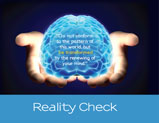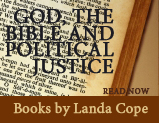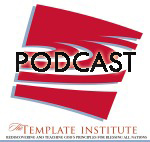God, the Bible and Political Justice: Chapter 5
The Foundations of Biblical Thought:
Five Tacit Assumptions
Before we move on in Genesis with God’s progressive revelation of His struggle with justice we must look at five tacit, “implied without being stated”, assumptions, “things assumed to be true,” that all of Scripture builds. These five assumptions along with the four beings and four institutions of authority form the non-negotiable threads in the Biblical weave of God’s thinking. We are given four of these assumptions in Genesis 1-3 and the fifth is implied:
*God is and is who He says He is.
*God is the Creator of the material universe, seen and unseen, and it is good.
*Human individuals, male and female, are created in the image of God and His central purpose for all creation.
*Everything that God has created is damaged by the fall of man and sin.
*Everything that is damaged is redeemable through the blood of Christ.
It is impossible to overestimate the power of assumptions in all of our lives and cultures. We use them every day regardless of our religion, philosophy or worldview. Assumptions lay the foundation of every culture and therefore, our cultural definition of reality. Our “beliefs in action” will always be congruent with our tacit assumptions, even while denying our “beliefs in words.” We may say, “we trust God” while at the same time being riddled with fear and anxiety. We “love people” but “hate that group.” We “want freedom of choice” but “don’t want to be responcible for the choices we make.” Assumptions are always at work at the foundations of our thinking and even though we are not aware of them.
Feet and Floors
If you happen to be trapped in an International Airport overnight you will observe assumption at work in what people do to get a nights sleep. In Asian cultures it is culturally “assumed” that floors are clean and feet are dirty. You take your dirty street shoes off at the door and put on clean “indoor” slippers on your dirty feet when you enter a house. Home entryways in this part of the world are full of shoes for outside wear and slippers for inside wear. In Western cultures on the other hand, we generally assume floors are dirty and feet are clean. Therefore we are less prone to go barefoot, certainly do not take our shoes off every time we enter a home and have sanitary laws requiring us to wear shoes in restaurants and certain buildings.
When these two cultures come together for an unplanned night in an airport the Asian travelers are stretched out on the floor for a fairly comfortable, at least horizontal, nights sleep. Floors are clean! But the Westerners are twisted and tangled into the airport lounge chairs, painfully assuring a visit to the chiropracters office and an uncomfortable night. For them, the floors are dirty! We are observing two completely different maps of reality, two different worldviews, at work.
Who is right? Who is wrong? From God’s perspective floors and feet are both more or less clean and dirty. We could test the cleanliness and come up with a germ and bacteria scale to asses which floors and feet are dirtiest. But meanwhile the Asians sleep on while the Westerners twist and turn all night in armchairs each locked into their cultural assumptions. This example is more entertaining than it is consequential. However, what happens when the assumptions we make are about more implicative matters?
Major cultural divides exist around questions of the existence and nature of god, value of the individual, group, gender, marriage, time, the material world and how it functions, land, the right to own, safety, authority, who has it and who does not. The list is long and the assumptions are extremely different, often painfully conflicting and, for the most part, silent.
Grid Work of Reality
Our assumptions lay the grid for reality as we understand and practice it. We fit the information that we receive through experience, family, culture and education on to that grid. We measure the unseen world from that grid and act accordingly. We weave sophisticated tapestries of reality and truth that have profound impact on the way we see the world and how it works and what we perceive the problems and answers to be. Unchallenged, we rarely if ever question these tacit assumptions, if we even see that at work.
Time goes in a circle
Unseen world controls
Death: individual group
Limited resources
Population is the problem
Sex
This is profound and implicative stuff and our world is working with assumptions every day. We accept them as “reality.” We work to design solutions around these “beliefs.” We work to legislate them into law. But are they true? What assumptions are we building on that may not be true to reality?
How could any one of us evaluate the assumptions of the culture or beliefs of the age they live in? Our data and experience are limited. No one of us was present at the origins of the universe. Not one of us has, nor can, travel to the extremities of the cosmos and document exactly how it works. We cannot know everything but we all can and do know “something.” We are working with the information we have and with the assumptions our experiences and cultures have given us. We are all “culturally blind.”
If our assumptions are true our view of reality may be true. If our assumptions are false our view of reality will be distorted and our solutions, while well intended, may be skewed producing outcomes we had not intended, or worse yet, creating even larger problems. Nowhere is this truer than in law and governance. If we are blind to where authority “ought” to be and what authority “ought” to be given as well as the values and rights that should be upheld by that authority, we are dangerously blind.
But what if we are not left to our own understanding? What if there is an objective, infinite source with first hand information and experience? Then there is the possibility that we could “see” again.
God’s Five Foundational Assumptions
God gives us five “revealed” truths in Scripture on which to build our understanding of reality. These truths must be “revealed” by God because they are beyond our human ability to experience or know. All Biblical thought and teaching is anchored in these five assumptions. As believers, we hold them to be true because God is real and He knows. He reveals these truths to us in the cosmos, in Scripture and through His Son. When we hold these five Biblical assumptions in place we cannot drift far from a Biblical view of reality, or justice.
Assumption #1: God is and is who He says He is!
The Bible is not an apologetic for the existence of God. It is inspired by God and assumes His reality. It is written for those who believe. The Cosmos is God’s apologetic for His existence and nothing we discover in the material world can deny God because it all reveals Him. Galileo said that God wrote two Bibles, the cosmos and the Scriptures. In the Old Testament the “Creator God” is the most often repeated name of God and in the New Testament Paul declares all mankind responsible because:
19 since what may be known about God is plain to them, because God has made it plain to them. 20 For since the creation of the world God’s invisible qualities—his eternal power and divine nature—have been clearly seen, being understood from what has been made, so that men are without excuse. Romans 1
Scripture opens with the assumption that “God is” and works from there to reveal His character, thoughts, purposes and ways. God does not seek to prove that “He is” in the Bible. He seeks to reveal “who” He is and “how” He works. He reveals His unchangeable truths and then shows how they work out in history through man, family, tribes, nations and finally trough Christ’s incarnation, death and resurrection, the Body of Christ.
Any thinking that does not presuppose the reality of God is not Biblical. He is real and He is the basis of all that is true. Whether people know that or not is another matter. But as believers, we must know that it is true and build our life and our thinking on that reality. The key to thinking Biblically is to build our reality on God’s assumptions and we begin with “God is” and “He is all and always who He says He is.” To think like God thinks then requires we all give up those of our cultural assumptions that deny this.
This is the basis for guilt or innocence.
Assumption #2: God is the creator of the Universe, the material world, both seen and unseen, and it is good.
God reveals to us in Genesis 1 and 2 that the cosmos, everything that is, has its origins in Him. He is 1st Cause, prime reality. He is revealed through His creation and the material world. We are not to worship nature but nature will lead us to worship. Creation has an objective reality apart from God. It exists and it operates by laws, and those laws are discoverable by man. Their origin and sustainability are in God.
A philosophical brain twister asks the question: “If a tree falls in the forest and no person hears it, does it make a noise?” The Biblical answer is “Yes!” because the cosmos does not need human experience to make it real. It has a reality all its own and functions with or without man’s presence through laws created by God. Humans are also real and add but do not subtract from the objective reality of the created order.
The miracles of today are the science of tomorrow because God is working with the universe He created and we can discover how it works. God has a higher level of understanding of the laws of nature than we do, so the miracles will continue. He longs for us to discover those laws and use them to the benefit of man and the creation He has given us. Understanding the material world IS part of knowing God.
This is the basis of evidence.
Assumption #3: The human race, male and female, are created in the image of God and His central purpose for all creation.
On the fifth day God created the sea creatures and creatures of the sky and on the sixth day He created the land creatures including the first human being. God made all the earth’s creatures but the human creature was and is unique. In Genesis 1:26 He creates the human species in His own likeness and gives the human race authority over all other creatures. We, not the lion, are the kings of the jungle. In verse 27 and 28 God clarifies His plan and purpose for His human creation. Like all of the animals He has made, we are to multiply, migrate and fill the earth with “life.” But unlike any of the rest of creation we are given authority and responsibility over the earth and the material world. We are told to use that authority to “subdue” the earth and create, “cultivate” things that are good. Like God, we create, work, plan and move forward. Our work? We are stewards of God’s material creation, the Creator of the Universe delegate’s development and stewardship of the cosmos to us the human community.
This is the basis of personal responsibility.
It is important to note here that authority is given to man, male and female over creation but there is no authority given to man, male or female, over each other, Genesis 1:28. This will be important when we begin to discuss boundaries for institutions and the jurisdiction of all authority.
Assumption #4: Everything God has made is damaged (fallen)
Authority presupposes the ability to choose and act independently. This means that it can be used or abused. Some types of authority can be resinded, but then it is something “you have” not something “you are.” God has not just “given” us authority as humans. He has “made” us with authority. To take that authority away God would have to destroy the very object of His creation, His image in us, reducing us to animals. The risk of giving authority is real and God takes that risk. In Genesis chapter 3 we see just how serious that danger was and is.
In chapter 3 humans are new to the job of dominion. The only thing they have created so far is language, words to describe God’s material world and each other. There is no sin in the Garden. But there are choices. God has, from all the trees He created; told them there is one they may not eat from, the tree of the “knowledge of good and evil.”
In Hebrew the word “knowledge” incorporates the concept of information and experience. To “know” your wife meant to have sex with her. Not to just recognize her in a crowd, repeat her name and remember who her father was. So the Hebrew understanding of what God was saying about this tree of the knowledge of good and evil was, if you eat of this tree, you will not only have information about the possibility of temptation you will become intimate with “evil” because you have “done evil.” In other words, you will have introduced evil as a reality into your experience and into creation. If you do not act on the temptation, you will only “know,” be intimate with, experiencialy understand, that evil could exist but it does not exist because you have not created it. Therefore you have no “knowledge” of it. Your knowledge and experience are at this point, only of the good.
But Adam ate the apple and sin became a reality in creation. Because of the authority of man over creation this has devastating, escalating consequences. The fact cannot be erased. Everything will be affected by it. We now live in a world polluted by sin.
This is the basis for crime, correction and punishment.
Assumption #5: Everything is redeemable!
There is a fifth assumption that all of Scripture builds on that becomes progressively clearer as God develops His plan through the Old Testament and into the New.
Speaking of Jesus, Paul writes:
18 And he is the head of the body, the church; he is the beginning and the firstborn from among the dead, so that in everything he might have the supremacy. 19 For God was pleased to have all his fullness dwell in him, 20 and through him to reconcile to himself all things, whether things on earth or things in heaven, by making peace through his blood, shed on the cross. Colossians 1
The fifth revelation from God, which will complete the Kingdom assumptions on which we build our thinking, is that everything is redeemable through Christ.
In Genesis three sin enters the world. Adam, male and female, create access through “acting on” the potential for disobedience. Of all the trees in the Garden, they eat from the one God has forbidden. I once heard this compared to releasing poisonous gas into the pure air of an enclosed space. You cannot see it, smell it or detect it in any way, but it is there nonetheless and it will have its progressive corrosive effect…“on everything!” Through out the rest of the Old Testament we will witness God helping His human creation understand what they have lost and prepare them to receive His ultimate solution, Jesus. We will see the corrosion of sin lead to insecurity, fratricide, genocide and violence threatening global destruction. Even with the Law, the values and ways of God, right in front of them Israel will continue the spiral towards destruction. God must help us. We cannot help ourselves. From Genesis chapter three on we are not just “doing” wrong things, we have become “wrong.” We, as a human race and the earth we inhabit, are damaged. We now “know” evil.
God sends the perfect antidote, His Son, the Messiah promised for more than two thousand years. The Great Mystery of God fulfilled in Jesus. Creation is real. The power of the human race is real. Choices are real and the destructiveness of those choices is real. The earth is contaminated. We cannot change that! But God has a saving inoculation. You do not have to take it but, if you choose to, the powerful destructive reality of sins effect in and through you can be neutralized and you can then become a vessel of antidote. We become the salt and light into a fallen world, working to demonstrate the power and wisdom of God in all of life. We are restored to our lost authority and destiny.
God’s way of restoring us is to first grant us a righteousness we cannot earn. This righteousness restores our ability to consult directly with God. Then, through the work of the Holy Spirit God begins to reveal and remove the false thinking that sin and separation from God have created and to renew our minds with His perspective of the cosmos, earth, and everything in it, including the human race. We become emissaries of light and hope, purifying, healing, and sustaining salt to our fallen world, 24/7. We continue with our original mandate from Genesis chapter one, to cultivate the earth, disciple all nations and reveal the glory of the Kingdom of God.
This is the basis of restitution and rehabilitation.
All Biblical thought build on these five revealed assumptions. If even one of these five precious truths is forgotten or ignored in our view of reality it will result is the skewing of God’s message and the nature and character of God Himself.
Justice will not be Kingdom justice unless it is built on God’s thinking.







